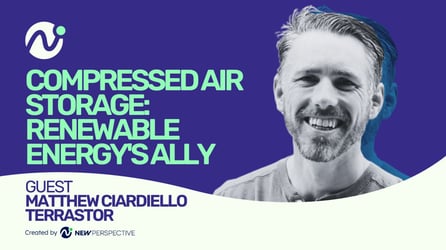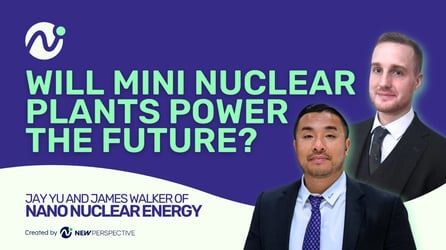Episode Info
The energy landscape is changing fast—what’s your take on it?
That’s exactly what we asked Russ Bates, the founder of NxtGen Clean Energy Solutions (NXTGEN), a company pioneering the transition to renewable energy for businesses.
🎥 Guest: Russ Bates, founder of NxtGen Clean Energy
📝 Full episode transcript
Hello Russ and welcome to the Green New Perspective Spotlight!
Russ Bates (00:05.303)
Hey, happy to be here. Thank you.
Dunya Jovanovic (00:08.482)
So let's start with an introduction. So Kellyn, tell us a bit about yourself, your background and what next-gen energy, clean energy is all about.
Russ Bates (00:18.639)
Sure. So, my background, I think it's pretty boring, but some people find it's interesting for, whatever reason. So that's flattering, but, my background is in fossil fuel power gen. I grew up in Southern Indiana, a lot of coal mines, lot of coal fired power plants. And, I was fortunate enough to become an IBW electrician. Went through a five year apprenticeship and spent a lot of time in that apprenticeship in, in.
power generation, fossil fuel plants, coal fired plants, lots of them in that area. So, I learned quite a bit as time went on and I kind of advanced in my career. I started looking at other things and solar, wind, batteries for a long time, they didn't make sense. And then all of sudden they did. And I found it very, very fascinating.
Decided I wanted to move in that direction. That's where I saw the future. and that was, that was a while back. so I made that transition and, whenever I did, one thing I noticed was, you've got these big utility scale projects, right? The big solar farms, the big wind farms, things like that. And then you've got residential. So a lot of people doing solar on their homes. but in between that commercial, and industrial sector.
and even, even smaller utility scale projects, nobody was really looking to, those folks at the time. And I thought, wow, that's, that's a great opportunity. I really think we can do something to help, that section of, of the economy. And I decided the best way to do it was to, start a company called next gen clean energy solutions. So what we do is, we consult, we develop projects and we'll implement those projects for those clients. So.
It all starts with consultation, having a discussion. What's the goals? Are there goals? What's the company or that business looking to accomplish? And then tailoring a solution around that. A lot of times it's solar. Solar is the big ticket I don't hear about, right? For a really good reason. It's advanced quite a bit. Over the last decade, it's incredible, the efficiency improvements and the economic improvements that have come with that.
Russ Bates (02:46.125)
So again, that's where it makes a lot of sense to do this, but sometimes it's wind and I'm talking micro wind turbines, battery energy storage is a, is a solution and those prices are going down. So that's becoming a much more viable option to, EV charging. That's something else we help with, solar street, parking lot lighting, solar smart poles where you can have wifi, projection. can do cameras.
Dunya Jovanovic (03:04.596)
Thank
Russ Bates (03:14.649)
facial recognition, environmental sensors, license plate recognition, gunshot detection, if that's a need, they can do that. So a lot of different things you can do there. But we'll really customize what makes sense for that client. We provide that additional bandwidth and expertise because sustainability, clean energy, it's fairly new and it can be a scary space to be in if you don't know what you're doing.
That's where we come in and kind of take a bit of a hand holding approach, walk them through step by step and guide them to achieve their goals. The big one for us is saving money. Of course you have the sustainability environmental aspects of that too. So whatever it may be, that's what we're looking to do.
Dunya Jovanovic (04:06.712)
Can you share a success story so that we can further explain how you're helping accelerate the clean energy transition?
Russ Bates (04:14.827)
Sure. I'll give an example of a municipality in Northeast Ohio. We put together their clean energy sustainability plan to achieve 2030 goals. This was in 2022. So we put this plan together. It's a very detailed plan. We have specific projects we put together with preliminary designs and budgetary financials and ROIs and all those great things.
Put that together as a short term, mid term and long term type of sections so they could do, all right, let's look at these low hanging fruit opportunities short term to kind of get the ball rolling and getting some momentum and then carry that into the mid and longer term to achieve that 2030 objective. So put that together, the sustainability committee unanimously adopted it.
the overall city council, I think two weeks later, unanimously adopted it. So it's those types of things that, know, just an example, but that's, that's one that kind of jumps out of the top of my head.
Dunya Jovanovic (05:23.502)
Well, that's exciting to hear, I have to say. My next question here is about scaling, since it's a big challenge in this space. So can we talk about that? Can you share a reason, let's say, obstacle your team faced while growing the company and how you work through it?
Russ Bates (05:39.823)
for next gen in general as far as scaling? Yeah, no, that's a great question. So I'll say at this point in time, and this probably goes for every clean energy company in the US, the challenge is what's gonna happen with this new administration, right? So whenever we started the company, we have Joe Biden and the IRA is passed a year later from when we started the company. So big.
Dunya Jovanovic (05:42.167)
Yeah, yeah, yeah.
Russ Bates (06:08.345)
Big changes there, I guess it's two years after we started the company, but, now you're hearing a drill, baby drill. You're hearing, rolling back these tax incentives, roll back the IRA, all those kinds of things. what does that mean? I don't know who can say what, what this next commander in chief is going to do. Cause it changes almost daily. Right. But if I had to guess, I would.
I would say the smart thing to do is if you want to roll something back, all right, maybe look at the grants that are out there, but don't touch the tax incentives because that's not only helping, you know, with clean energy and this brand new section of the economy. That's helping a lot of these red states, mainly red States, conservative States that overwhelmingly voted for Trump to get back into office. You know, the Texas, the Florida.
Michigan, all these states are doing tremendous things with clean energy. You not only have the projects, but you also have the manufacturing base that's coming back directly as a result of the IRA. So we're trying to onshore more of that manufacturing of solar panels, for example, that come from Southeast Asia, right? They're pretty cheap coming from over there. So, you know, if they roll back tax incentives,
If they start smacking these tariffs on like what they're talking, the US is going to fall further and further and further behind the rest of the world. I mean, we're already pretty far behind in my opinion.
Dunya Jovanovic (07:49.398)
and how do you feel the recent election results will impact your company?
Russ Bates (07:57.617)
It's hard to say. I'll, I'll point it at this. the, incoming administration recently started talking about tariffs on Mexico and Canada. Canada just last week started saying, all right, if you want to do tariffs on us, we're going to cut the, the energy that we send from Canada to the U S so.
Dunya Jovanovic (07:59.064)
You're welcome.
Russ Bates (08:23.945)
They specifically said, you know, they supply energy to New York, to Michigan and to Wisconsin. So if they're not going to supply that energy, well, it's got to come from somewhere. And we're already seeing a definite deficiency in, in new production. And that has to do with grid operators and getting these projects interconnected and things like that. All through that permitting process. But if something like that happens, you're going to see energy prices go up even more than what they're going up.
you know, in the next several years, that could open the space for companies like ours to, to come in and help get some energy independence. So they're not so dependent on that grid electricity, for example. So if I had to say there is something good, I guess I would say that, but it's not great. I'd rather we advance this the right way as opposed to kind of a
Dunya Jovanovic (09:21.24)
Seizing opportunities, right?
Russ Bates (09:23.245)
Yeah, yeah. I hate for that to happen, but if it is for our company, that's one thing I've looked at is all right, Michigan and New York and Wisconsin and anybody else, they're definitely going to need some more help and we're nationwide so we can help all of those folks.
Dunya Jovanovic (09:41.506)
I would like to end this conversation on a positive note. Since this podcast series is dedicated to, let's say, all of us being cautiously optimistic when we talk about the clean energy space. So do you have some upcoming projects or what's on the horizon for your company and the exciting initiatives we should keep an eye on?
Russ Bates (10:09.229)
Yeah, no, I'm with all that negativity. I just spit out there. I do want to say that in general, it's a, it's a revolution. It's a clean energy revolution that's happening, you know, whenever I think of the, the industrial revolution and read about that in the history books and how amazing that was. don't know if people who were around then understood what was going on, right? It's just, okay, we're making steel or electricity. We're doing all these things.
I think it's very similar to what we're going through now, except maybe there's a little more realization, know, given that history, hey, this is a, this is a big change, right? in the, in the electricity generation space. So with that said, you know, the U S is very far behind, but there's a lot of opportunity to, catch up and still, think lead, lead the world in this. it's, it doesn't really depend in my mind in the big scheme of things.
Who's in office, right? The clean energy transition was happening in Trump's first term. Biden came in, he accelerated a bit with the IRA and you know, that was a big deal. are we going to hit another speed bump with, with Trump? Maybe I kind of anticipate, some sort of speed bump. It's not going to be a wall though. Right. We're not going to come full stop. it's the technology is advancing too much. The economics make too much sense.
You know, it's something where fossil fuels, fossil fuels are fossil fuels, right? I'm not saying we're running out of them, but somebody said the Stone Age didn't end because they ran out of stones, Fossil fuel's not gonna end because we're running out of fossil fuels. It's because better technology is here and becomes better and better every day.
Dunya Jovanovic (11:56.886)
Not just better, but cheaper.
Russ Bates (11:59.002)
Yes. Yes. 100%. And that's, that's key, right? Whenever we're working with clients, we want them to save money. We want it to make economic sense and improve their bottom line. and you factor in a lot of things. The money's obviously a big part, but energy independence and knowing what you're going to pay for electricity on day one, once you get a system installed all the way through, you know, the end of that, that PPA or the life span of that, that system.
where right now you don't know what you're gonna be paying next year for electricity. We know it's gonna go up, it doesn't go down, right? So those are things to consider and we always want the best for our clients. So that's what we strive to do every day.
Dunya Jovanovic (12:44.302)
For us, thank you, since this is a short conversation, I have to ask you if some part of our audience wants to know more about you, your company, if they want to listen to you on the other podcasts, where can they do that?
Russ Bates (12:59.365)
I'm pretty easy to find on LinkedIn. Just Russ Bates. You can find a NextGen Clean Energy Solutions on LinkedIn. Find us a same website, nextgencleanenergy.com. It's N-X-T-G-E-N. There's no E in there because we're trying to be cool and hip, right? So we just spelled it N-X-T. But yeah, I'm pretty easy to find on LinkedIn. You're not going to find me on Facebook or TikTok or anything like that. I'm not that cool.
Dunya Jovanovic (13:30.584)
So let's stick to LinkedIn. Okay, don't worry. We'll add the links to your profiles in the description of the episode. So thank you, Wes, once again for being our podcast guest.
Russ Bates (13:32.119)
LinkedIn. That's it.
Russ Bates (13:37.317)
I'm also.
Russ Bates (13:41.611)
Absolutely glad to be here. Thank you.
🕑 Key Takeaways:
━━━━━━━━━━━━━━
➜ NxtGen Clean Energy focuses on consulting and implementing energy projects.
➜ Solar energy has seen significant efficiency and economic improvements.
➜ Success stories include municipalities adopting clean energy plans.
➜ Scaling clean energy companies faces challenges from political changes.
➜ Tax incentives are crucial for the growth of clean energy.
➜ The U.S. has opportunities to lead in clean energy innovation.
➜ Energy independence is becoming increasingly important.
➜ The clean energy revolution is comparable to the industrial revolution.
➜ Technology advancements are making clean energy more economically viable.
🎧 Subscribe to our podcast
💬 Follow GNP on Social




